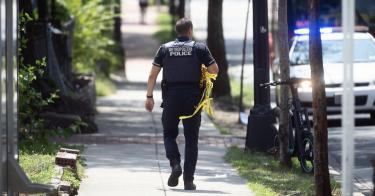As our nation’s capital, Washington, has millions of visitors each year. Hundreds of thousands work in the District, and around 700,000 people live there.
Few feel safe.
That’s because the District is experiencing a predictable crime crisis caused by pro-criminal policies enacted by the D.C. City Council, and it’s affecting everyone.
Members of Congress and their staff have been assaulted. Visitors and foreign diplomats have been robbed. And businesses are threatening to close in city neighborhoods that can least afford to lose them.
The statistics paint an even worse picture: Homicides are up 37% compared to this time last year. Robberies are up 66%. Auto thefts are up an astounding 106% (5,343 year-to-date), and carjackings are up an equally astounding 108% (745 year-to-date).
Despite back-to-back years with more than 200 homicides, the District is on pace to experience more homicides in 2023 than in any year in two decades.
So, what happened?
>>> The Red State Murder Problem Becomes the Blue County Murder Problem
The District’s local elected legislature, the D.C. City Council, passed a series of radical “reforms” that sent the unmistakable message that crime in the District would be tolerated.
As we have explained elsewhere, the final bill passed by the council eliminated mandatory minimum penalties for every crime except first-degree murder; reduced the penalties for most crimes (including first-degree murder); and expanded the already hotly debated ability of violent felons to be released from prison early.
The District’s then-chief of police, the U.S. Attorney’s Office for the District of Columbia, and Mayor Muriel Bowser all opposed the bill implementing these radical provisions. The mayor even vetoed it, but the council overrode her veto on Jan. 12, by a 12-1 vote.
Thankfully, a bipartisan majority of both houses of Congress stepped in and, exercising their constitutional authority over the District of Columbia, overrode the bill. President Biden agreed and signed the override into law.
But the council passed another radical bill implementing at the local level many of the most contentious provisions of the George Floyd Justice in Policing Act, a failed bill proposing nationwide police “reforms.”
Majorities of both houses of Congress again overrode this local legislation, but Mr. Biden vetoed that override and let the bill become law, a move consistent with his efforts to implement these problematic policies via executive order.
The result was that the recruitment and retention issues that many police departments are facing have been amplified in the District.
The D.C. police force has fewer officers today than at any time in half a century, with the force short about 500 officers and some estimating that the District could be short almost 1,000 officers by the end of fiscal 2024.
That’s why it’s ironic—or as the D.C. police union put it … “insane”—to see some D.C. Council members, such as Charles Allen say that “we need more officers on the force.” Just a few years ago, when he was chairman of the council’s Judiciary Committee, Mr. Allen himself spearheaded efforts to coddle criminals and hamstring the police.
That’s right. In July 2020, Mr. Allen led an effort to cut $15 million from the police department’s budget as part of “grappling with the undoing of centuries of layered systemic racism and permutations throughout our society.”
Despite anticipating that “force numbers [would] start to drop by about 200 officers,” which he said was the “single biggest reduction to MPD [he’s] ever seen,” Mr. Allen suggested that he would still support further cuts because “racial justice won’t be achieved in a single budget.”
Now, Mr. Allen is trying to flip-flop on crime.
>>> The D.C. City Council Failed at Criminal Justice Reform—Congress Must Fix It
In direct contradiction with D.C. Council Chairman Phil Mendelson, who made the baseless claim that there is “no crime crisis” in the District in testimony in front of Congress this past March, Mr. Allen now claims that “crime [is] at an unacceptable level, so that is a crisis.”
Brooke Pinto, current Judiciary Committee chair, agrees and has put forward her Secure D.C. Plan, which includes some modest steps to hold criminals accountable for their actions.
Hearings on various aspects of the plan are ongoing this month with efforts to pass many of its provisions before temporary emergency crime legislation the council passed expires on Oct. 18.
Considering how criminal-friendly the council’s previous actions were and how unwilling council members such as Mr. Mendelson have been to take any responsibility for such egregious and criminal-friendly actions, even a minor course correction like Ms. Pinto’s plan looks promising by comparison, though that’s not saying much.
But notably absent from the plan is a comprehensive strategy of how to appropriately deal with juveniles who commit crime—including charging juveniles as adults when appropriate, something the D.C. attorney general has generally pledged not to do.
It is imperative for Congress to step in and draft a commonsense criminal code for the District of Columbia that would truly serve the best interests of the community by holding all criminals accountable and allowing victims to receive justice.
So far, the D.C. City Council has been unable—or unwilling—to do that.
This piece originally appeared in the Washington Times





